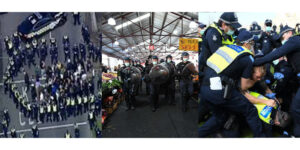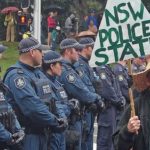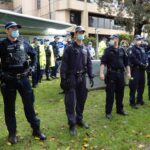Victoria Police Ramps Up Offensive Against Protests

There’s something very disturbing about scenes from the anti-lockdown protest at the Queen Victoria Market in Melbourne over the weekend.
There’s a series of video footage posted online which shows scores of heavily armed and riot squad police far outnumbering protestors standing around, or sitting, or shopping, and many are chanting: chanting “peace and love” and “freedom”.
And yet, 74 people were arrested and $280,000 in fines were handed out to those caught breaching lockdown restrictions. In one video, three police officers tackle a protestor, and an officer can be clearly seen kneeling on the man’s neck while he is face down, being handcuffed.
The protest’s leader is now also facing an incitement charge as police prepare a search warrant for his home in Burwood East.
Who is ‘policing’ the police?
In the wake of the protest, Victorian Premier Daniel Andrews praised the work of police ‘who did a good job in very difficult circumstances.’ He also added that: ‘protesting is stupid and dangerous and those who do it will be dealt with.’
It’s a worrying sign of the erosion of democracy when the state’s Premier fails to see the one thing that is pretty clear to most other Australians: Melbournians are tired of the lockdowns, the heavy police presence around their city and the fact that people’s movements are being monitored 24/7, all of which show no signs of abating.
And, before Covid-19, and before the states implemented strict public health laws to mandate public gatherings and individual social distancing, protesting was a perfectly normal way for Australians to express their views.
But now, of course, that right is denied. In Melbourne public gatherings are strictly forbidden and people are confined to their homes except for one hour a day when they can travel for limited purposes and only within 5 kilometres from home without an exemption.
A number of checkpoints are in operation around the metropolitan areas, and police are using number plate recognition technology to detect vehicles registered to ‘stage four’ areas.
Police abusing their powers
Many Australians are also starting to be very concerned that the extra powers afforded to police under Covid-19 public health enforcement laws have allowed them too much leeway to be able to ‘bend’ some of the rules of otherwise ‘normal’ policing. For example, that ‘arrest should be a measure of last resort.’
A Victoria police spokesman said many of the weekend lockdown protesters were aggressive and threatened violence towards officers, with one charged with assaulting a police officer in execution of their duty.
But much of the video footage refutes that statement. While a handful of protestors were agitated, and some threw fruit, by and large the crowd seemed compliant, although some did shout: “This is not a police state” and “you’ve got to be on the right side of history”.
The ‘threatened violence towards officers’ is a cry that we often hear from police, and sometimes a difficult one to prove, despite the fact that there is a constant stream of video footage, not just from the weekend protests but of various incidents in recent times in which clearly, police after often the ones using unnecessary force.
Woman ‘dragged from her car’
In fact, the weekend protests in Melbourne were sparked by video footage posted on social media by a Victorian woman, Natalie Bonnet, who was dragged from her car by police for not stating her name at a vehicle checkpoint. She had been stopped for allegedly not having a legal phone charging device mounted to her car.
In the video – which has been shared thousands of times online – she tells the police officer she is ‘scared’ to leave her vehicle because he is armed. Following this, the police officer reaches over her, unbuckles her seatbelt and manhandles her, pulling her out of the vehicle.
She alleges four officers had their knees in her back and she couldn’t breathe as they handcuffed her.
It’s understood she will face charges including: driving with obscured vision, failing to produce a licence, failing to state her name and address, resisting arrest, assaulting police and offensive language.
As tensions escalate between police and the general public, there’s also a growing sense of mistrust in the police force, particularly in Victoria, but it’s not isolated to the state, and it’s it only further perpetuated by these incidents in which people are intimidated and manhandled. There is no doubt that being the victim of such behaviour can have lasting detrimental emotional effects.







